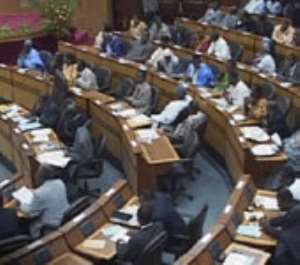
He does not provide either listeners or readers of the Universnews.com website with any competent comparative analysis of the existing statutes governing the various public universities in the country presently, so it is very difficult to make any conclusive assessment of whether the proposed draft-bill seeking to bring all the public universities in the country under a single umbrella will be far less conducive to the protection of the academic freedom of the professoriate than the existing ones, which Mr. Kofi Bentil, the Vice-President of the IMANI-Africa think-tank, implicitly, seems to think and believe to be perfectly in synch with the tide and climate of the times (See “Public Universities Draft Bill Will Limit Academic Freedom – Kofi Bentil” Radio Univers.com 4/11/19).
Mr. Bentil predicates his disapproval of the new draft-bill on grounds that the latter demands a drastic reduction in the number of University Governing Council Members from 15 to 9, with the President of the Democratic Republic of Ghana being empowered with the right and/or privilege of directly and personally appointing 5 out of the newly proposed 9 Council Members, or approximately 60-percent of the same. The IMANI-Africa think-tank critic does not tell his audience how many of the present 15 University Governing Council Members are appointed by the President of Ghana and the Supreme Commander of the Ghana Armed Forces; so, the critical observer is scarcely sure of what to make of these numbers. Indeed, the impression, by default, that the critical observer gets is that presently the President has far less appointing power on the University Governing Councils. It is also not clear whether such ratio pertains equally to all of the dozen, or so, major public tertiary academies in the country or it pertains to only a small fraction of the same.
As for the argument vis-à-vis the purported attempt in the draft proposal to confer more power to political actors over our public universities, it is at best dubious, because it is widely known that nearly every one of the Vice-Chancellors, or Chief Administrators, of these taxpayer-supported academies is either a staunch partisan of one of the two major political parties in the country or visibly sympathetic to the same. Indeed, it has been widely suggested that had the Vice-Chancellor of the Kwame Nkrumah University of Science and Technology (KNUST), Kumasi, been known to be either a card-carrying member of the ruling New Patriotic Party (NPP) or even a staunch sympathizer of the latter ideological camp, at the time of the widespread student disturbances that rocked the KNUST campus last year, during which both private and public properties valued at hundreds of thousands of dollars (USD) were either thoroughly destroyed or heavily damaged by rioting student protesters, there may not have been immediate calls from official circles for the KNUST Vice-Chancellor, Prof. Kwasi Obiri-Danso, to tender his resignation and be promptly replaced by one of the deans of the University.
Now what this implies is that there has been an established unhealthy culture of the political inflection or coloration of how our public universities are run, the fault for which both the ruling New Patriotic Party and the main opposition National Democratic Congress deserve to equally share the blame. The preceding may constitute the primary basis for the impugnation of the integrity or wholesomeness of the newly proposed Public Universities Bill, in particular the portions of the bill that seek to confer on the President of the Republic of Ghana and his Education Minister, powers that far exceed that which are presently wielded, respectively, by these two elected public officials.
Without naming any specific people or government operatives, Mr. Bentil, that is, the IMANI-Africa think-tank Vice-President, is concerned that while the Akufo-Addo-sponsored proposal may be well-intentioned, nevertheless, this draft-bill may yet open up the possibility of undesirably and inexpediently gifting future undemocratic leaders or tyrants with what may be equated with the Anti-Academic-Freedom Nuke-Button or Code. And when that day, finally, comes to pass, the current bevy of executive operatives, who may have long since exited from power, may be all the more regretful for having so woefully failed to foresee such an apocalyptic moment. It is quite obvious the sort of unscrupulous Tyrants-in-Waiting to which Mr. Bentil maybe alluding.
*Visit my blog at: kwameokoampaahoofe.wordpress.com Ghanaffairs
By Kwame Okoampa-Ahoofe, Jr., PhD
English Department, SUNY-Nassau
Garden City, New York
April 14, 2019
E-mail: [email protected]




 We’ll protect state wealth from opaque deals – Prof Jane Naana
We’ll protect state wealth from opaque deals – Prof Jane Naana
 Mauritania president says running for second term in June polls
Mauritania president says running for second term in June polls
 I won't ever say I was a mere driver’s mate' — Prof. Opoku-Agyemang
I won't ever say I was a mere driver’s mate' — Prof. Opoku-Agyemang
 2024 polls: 'EC struggling to defend credibility'— Prof. Opoku-Agyemang
2024 polls: 'EC struggling to defend credibility'— Prof. Opoku-Agyemang
 Akufo-Addo gov't's 'greed, unbridled arrogance, unrestrained impunity, sheer dis...
Akufo-Addo gov't's 'greed, unbridled arrogance, unrestrained impunity, sheer dis...
 Election 2024: Ghana needs an urgent reset, a leadership that is inspiring – Ma...
Election 2024: Ghana needs an urgent reset, a leadership that is inspiring – Ma...
 Partner NDC to rollout a future of limitless prospects – Prof Jane Naana Opoku-A...
Partner NDC to rollout a future of limitless prospects – Prof Jane Naana Opoku-A...
 NPP will remain in gov’t till Jesus comes — Diana Asamoah
NPP will remain in gov’t till Jesus comes — Diana Asamoah
 Sunyani Technical University demands apology from former SRC president over sex-...
Sunyani Technical University demands apology from former SRC president over sex-...
 'Dumsor' was resolved by Mahama but ‘incompetent' Akufo-Addo has destroyed the g...
'Dumsor' was resolved by Mahama but ‘incompetent' Akufo-Addo has destroyed the g...
